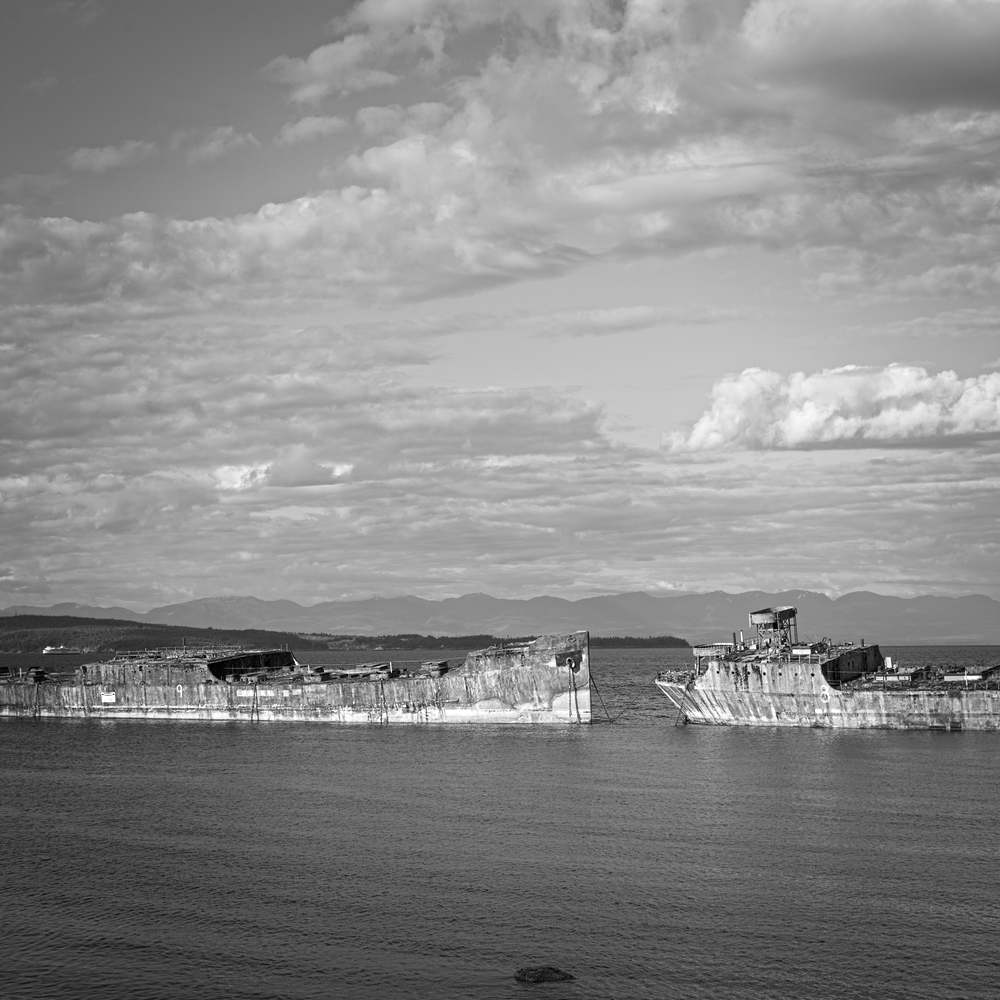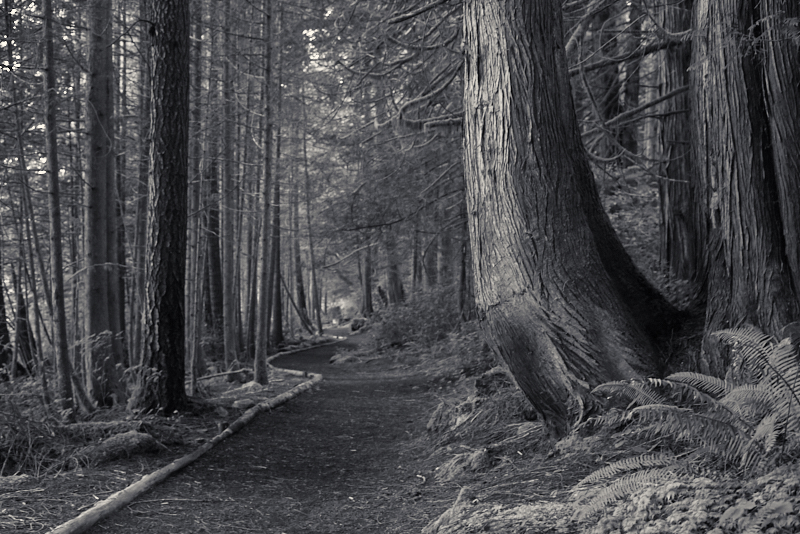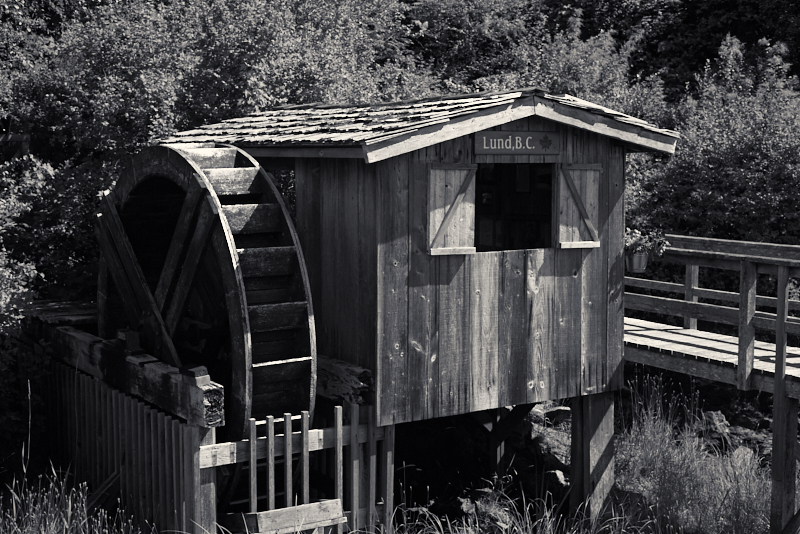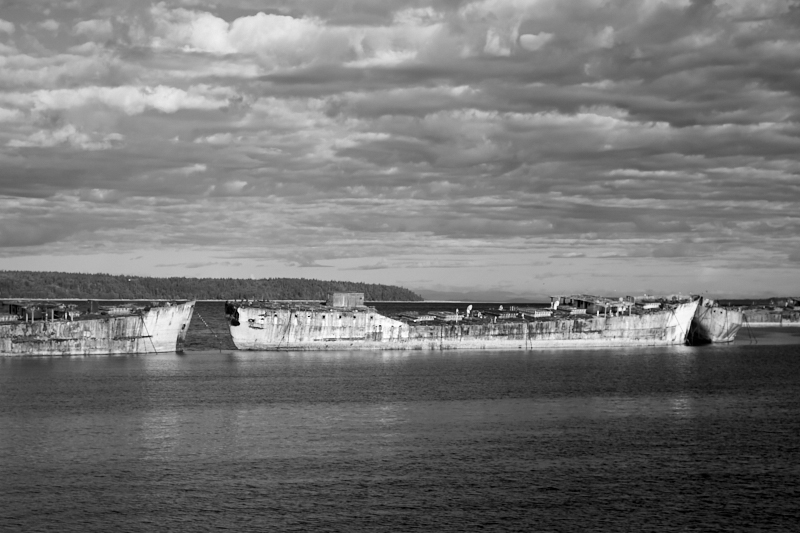The Salish Sojourn XII
Powell River, British Columbia

The Hulk Breakwater, Powell River, BC
We will only spend one full day in Powell River, so we decide to take advantage of the outdoor attractions of this beautiful region. We are in a land of mountains, saltwater fjords, and lakes. Where do you concentrate your efforts with so many options? We settle on Inland Lake, a large body of water, ten miles from Powell River, that is encircled by a 14 km (8.5 mile) trail.
We shudder down a washboard-rutted logging road, past signs warning of dynamite blasting, and finally reach the Inland Lake campground. Once again I am amazed by the underutilized facilities: a couple of people are camping, but most of the sites stand empty. It is July in British Columbia, peak vacation time — where is everyone?
The Inland Lake trail is well-groomed, about five feet wide, and lined on each side with fallen logs. The terrain is flat, and it is probably one of the few trails in Canada (or possibly anywhere) that is wheelchair friendly. We set off into the cool morning, following a counter-clockwise course around the lake.

A well-maintained trail, Inland Lake, Powell River, BC
The trail is a naturalist's delight. Wildlife, in the form of small critters abounds — the country is crawling with snakes, tiny thumb-sized tree frogs, and the occasional squirrel. Near the top of the lake, a raven begins its raucous call. Although the day began with sunshine, clouds have slowly begun to cloak the forested mountains that cups the lake. The lake is still, mirroring the snags and fallen logs that bisect its surface.
At a couple of points along the trail, we pass signs for "portages" to other lakes. Presumably these are for canoeists or kayakers who, having paddled across Inland Lake, want to hoist their craft upon their shoulders and carry them over a mountain pass to another lake. I can't imagine doing it, and am impressed that there are people who would try.
For most of the hike, we are alone. We don't encounter anyone until the northern end of the lake, when a woman and her dog run past in the opposite direction. Mountain bikers begin to emerge near the end of the loop, but we have spent most of the morning in solitude.

The Inland Lake Trail, Powell River, BC
After our brisk morning workout, we head back at the Old Courthouse Inn for lunch. In addition to its other charming (interior) features, the Inn also has a small diner, Edie Rae's Cafe, lodged in its northwest corner. The diner serves breakfast and, for lunch, a specialty that Mary and I are eager to try: Poutine.
Poutine is a delicacy that originated in Quebec. Although regional interpretations abound, it's central elements are french fries, cheese curds, and gravy. In other words, it is comfort food, a mountain of cardiovascular trauma on a plate. At lunch time, operating under the name of Pappy's Poutinerie, the diner does a brisk business, serving eight variations on the theme. I opt for "The Pappy," which adds sauerkraut and "Montreal Smoked Meat" to the basic poutine. It is delicious: thick, rich, dripping in gravy and melted cheese curds. I'm glad I hiked 14 kilometers in the morning; I might almost break even on calories.
If you are in Powell River at lunch time, I strongly recommend Pappy's Poutinerie. I don't think a trim waistline could hold up to a daily serving of poutines, but as a rare treat, they can't be beat.
Our legs sore, stomachs poutine-stuffed, we find that we have little energy for vigorous afternoon activities. We drive north to Lund, a tiny town on the edge of Desolation Sound. Lund's principal attraction is its small marina that serves as a point of departure for boats exploring the Sound. A few stores and restaurants line the shore, but it doesn't take long to exhaust the tourist attractions of Lund. They do have an old waterwheel, once used to generate electricity, but it no longer works and has been converted into a makeshift visitor's center.

Old Waterwheel, Lund, BC
Back in Powell River, we cram in one final attraction. Because the paper mill stands on an unprotected shoreline, barges have always been at risk while loading and unloading. In the 1930s, the paper mill wanted to build a breakwater to create a protected harbor. The only problem was that the water was too deep for a conventional stone breakwater.
The mill engineers came up with an ingenious idea of building a breakwater out of decommissioned ships. Nineteen ships have been cabled together and filled with ballast to form a steel breakwater. It was a clever solution, and today you can hike down to the water's edge to look at the hulks, slowly rusting away before the elements.

The Hulk Breakwater, Powell River, BC
Unfortunately our time in Powell River has come to an end. There is much we haven't seen, trails left unhiked, and the wilderness of Desolation Sound still to be tapped. Moreover, we have left seven types of Poutine untested. As with many towns on the Salish Sojourn, we depart wishing we had one more day, but sadly, we don't.
If you are enjoying this series, why not subscribe to Richard's monthly newsletter, What's New in Old News? The Peripatetic Historian is on the road, roaming the world and compiling fresh adventures. Don't miss out. Click here to join the legions of above-average readers who have already subscribed.